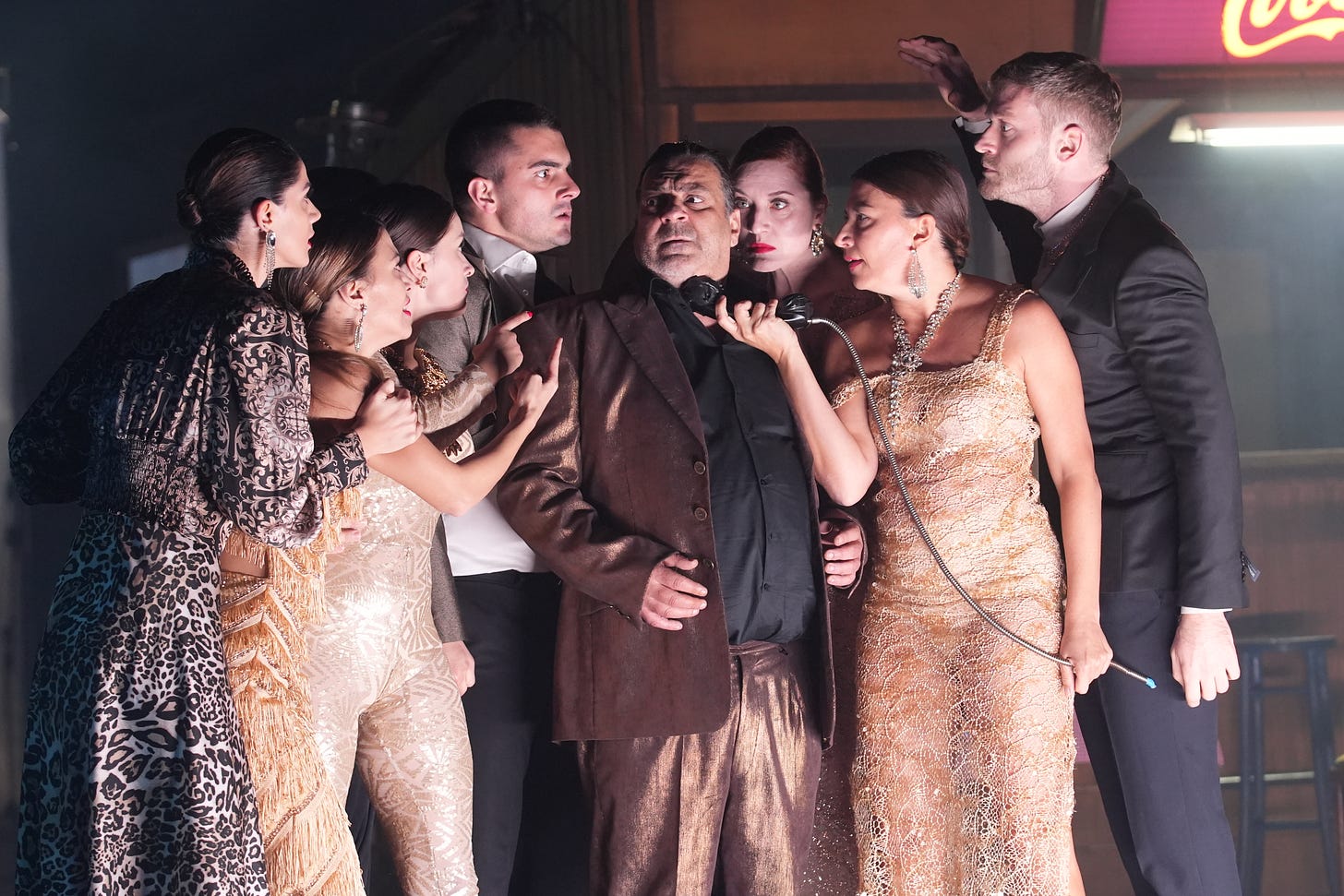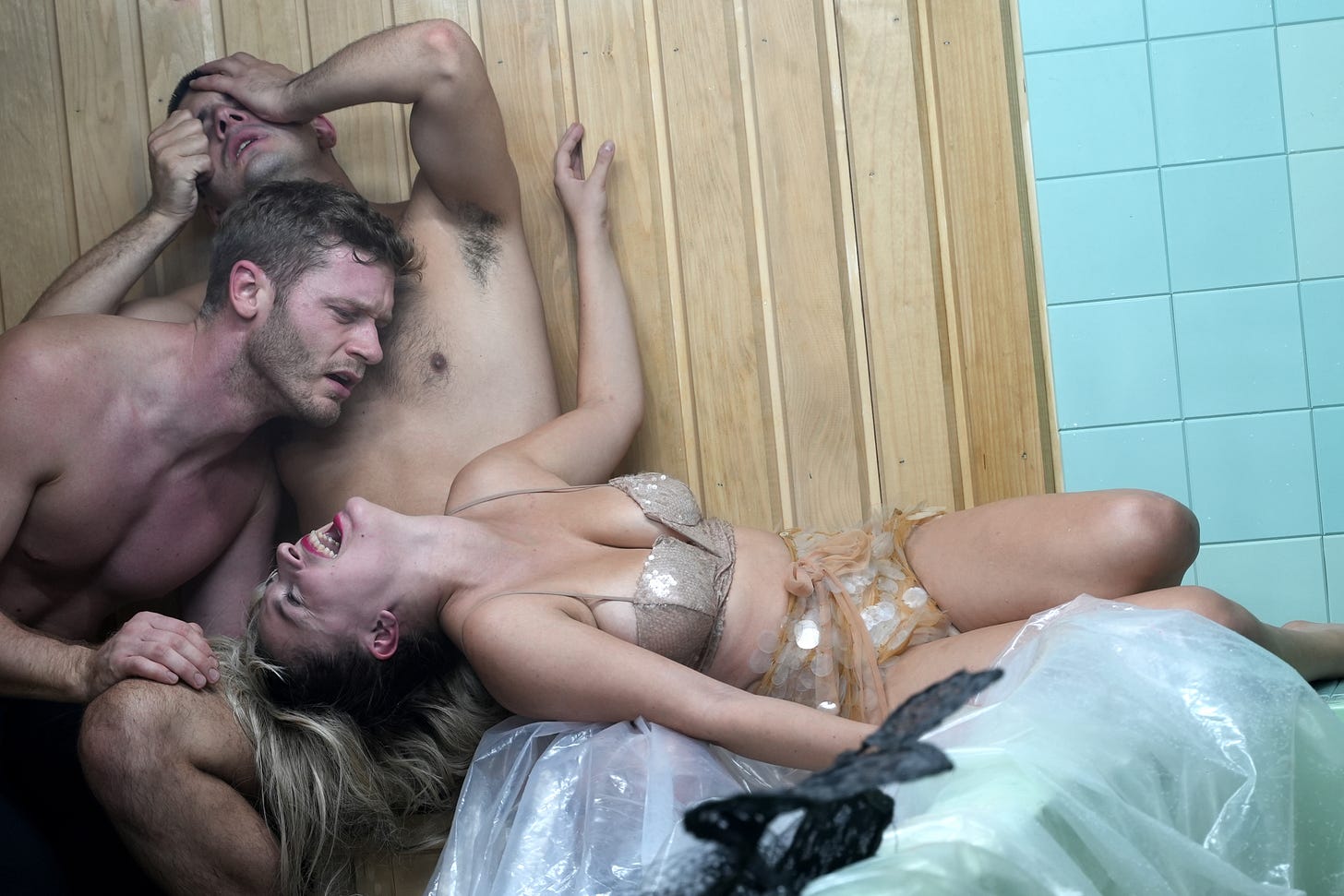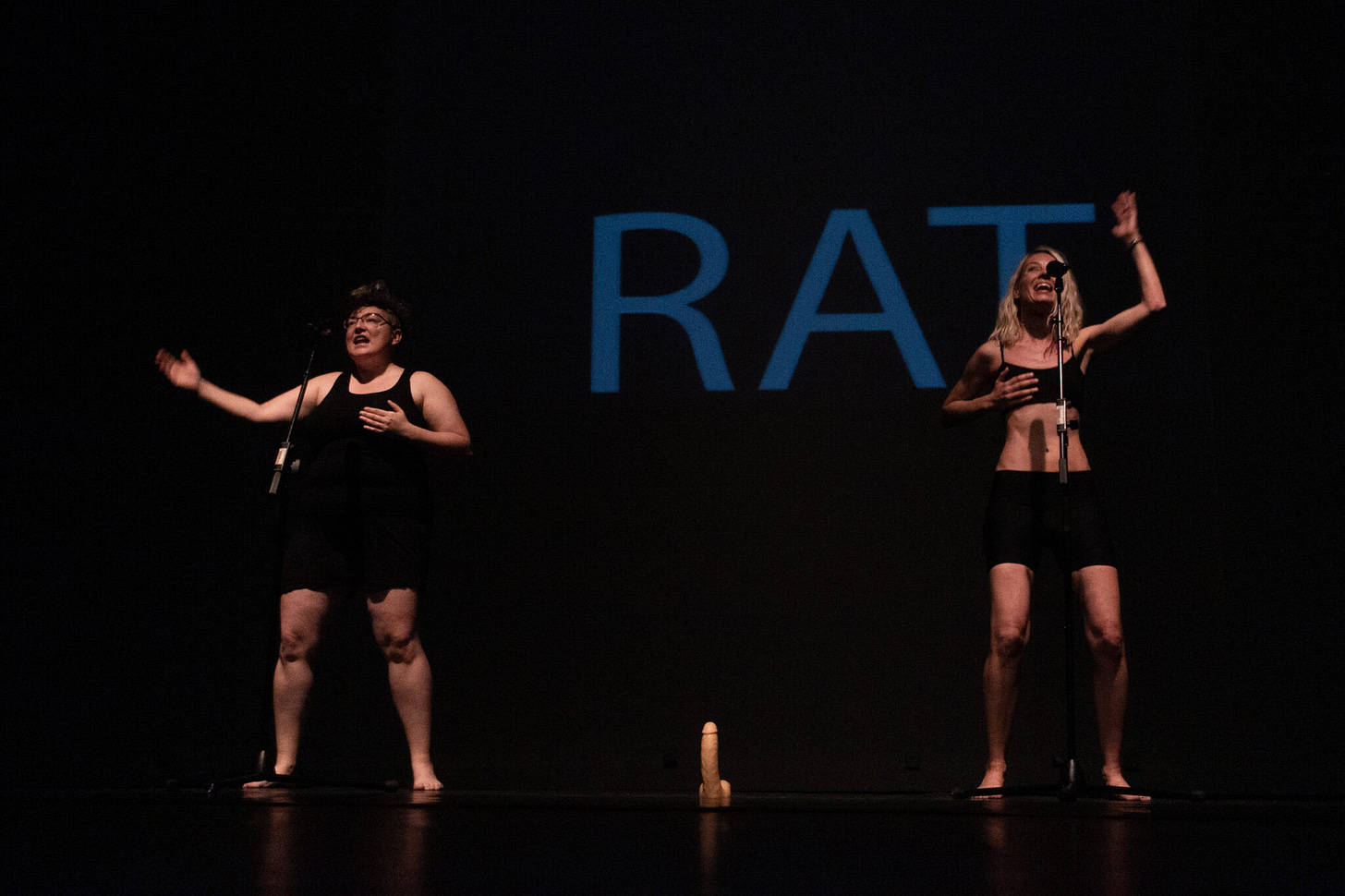Circles of hell: Frank Castorf's The Divine Comedy
In which I am left cold by five-and-a-half hours of Castorf.
Welcome to Café Europa, a new-ish weekly newsletter dedicated to European theatre. Here, you can expect a mix of in-depth reviews, profiles of artists and festival coverage.
Welcome to all new subscribers who came here via Fergus Morgan’s The Crush Bar, a newsletter devoted to emerging theatre makers in the UK. Fergus is someone to whom it’s well worth subscribing if you’re not already doing so. Thank you too to my new paid subscribers, it really makes a difference and will allow me to expand my coverage. As is the way these days, I also have a Ko-fi account. I want to keep as much of the content free as possible, so all donations are very welcome. And if you find this newsletter valuable and think others would too, please do spread the word!
Throughout his long career, including a quarter of a century as the director of Berlin’s Volksbühne, Frank Castorf didn’t just shape Germany’s cultural landscape, he transformed it. His performances dismantled classic texts, rejected linear narratives and divided audiences. He’s been sued by the estates of Tennessee Williams and Bertolt Brecht for diverging from the text. His detractors call him a “wrecker” of texts.” In 2013, his production of Wagner’s Ring cycle was enthusiastically booed by German opera audiences. All of this has only bolstered his formidable reputation.
Since leaving the Volksbühne, Castorf has remained prolific and itinerant, directing in Zürich, Berlin, Hamburg, Salzburg, and most recently Medea at the Athens Epidaurus Festival this summer. Last year his production of The Divine Comedy opened at Belgrade Drama Theatre in Serbia, a theatre that regularly attracts major international names to the city. That production was chosen as the for this year’s BITEF (Belgrade International Theatre Festival), which over its 57 year history has showcased the work of avant-garde theatre makers, including Castorf.
Castorf’s productions typically weave pop cultural references into classical texts in a non-hierarchical fashion. They utilise a mixture of live video footage, music, nudity, and food, They are large in scale and notoriously long: four, five, sometimes six hours.
His five-and-a-half hour production of The Divine Comedy for Belgrade Drama Theatre does not limit itself to Dante, including elements of Peter Handke’s novel The Goalkeeper’s Fear of the Penalty as well as academic treatise on Dante and a Tarantino screenplay. Nor does he limit himself to the main stage of the Belgrade Drama Theatre. The performance spills over into the backstage and under-stage spaces of the theatre, into the theatre’s dressing rooms and corridors, into the arena behind the theatre which is used for outdoor summer performances, even into the street, much to the bemusement of passers-by. A cameraman and sound operator shadow the cast around at all times and the filmed images – often tight close-ups – are projected on a large screen that sits on one side of the stage.
Castorf’s regular collaborator over the last decade or so, the designer Aleksandar Denić, himself from Belgrade, uses the full depth of the stage, up to and including the back wall of the theatre. His design includes a pool of water through which the actors frequently splash (presumably one of the five rivers of the underworld) and a small roadside café complete with oven, which can be rotated. There are further rooms which we can only enter via video: a seedy hotel room, a sauna, a chamber constructed largely from Coca-Cola crates.
For the first quarter of the production, footage of Belgrade at night plays on the screen, though later this will be replaced by footage of the actors, as the camera explores the parts of the set hidden from the audience’s view. The production follows the plot of Handke’s novel – also the basis of Wim Wenders’ debut film – fairly closely. Despondent goalkeeper Joseph Bloch (played by Marko Gvero) goes to a cinema and picks up a woman who he ends up killing in a cheap hotel room. In fact Castorf includes so many scenes and passages of dialogue from the novel that, in the beginning at least, the production feels more focused on Handke than Dante.
The entrance to hell is depicted like nightclub with revellers jostling in a crowded doorway guarded by a bouncer. We also get a scene in which a pile of bloody meat is pulverised with a cleaver before being turned into soup and fed to Beatrice with a spoon. She ends up gorging on the crimson liquid, smearing it on her face. The restaurant portion of the set rotates to reveal a neon sign declaring HEAVEN IS A PLACE WHERE NOTHING EVER HAPPENS and a large advertisement for Italian tomato sauce, which one of the actors licks as if it to test whether it is edible. A sense of ressentiment permeates the performance in respect of American culture. The Coca Cola logo saturates one section of the set. This even extends to the costumes of the female performers who end up dressed in red Coca-Cola capes, bikinis and knee-socks, looking like some kind of late-capitalist Justice League.
Actually, let’s take a moment to talk about costumes. Designed by another regular Castorf collaborator, Adriana Braga Perecki, they are undeniably opulent: bronze suits, fur coats, lavish headdresses and necklaces. Many of the dresses are diaphanous to the point of transparency. There’s an abundance of female arse-cheek on display and one of the angel costumes is cut so high it’s a couple of centimetres shy of making gynaecologists of the front row. While it’s true that the male cast members get partially undressed for the sauna scene, the way the women’s bodies are presented – even when the cast are debating Dante’s poetics, Castorf ensures we get a glimpse of their knickers - coupled with scenes of women being strangled, smothered and literally fridged – one performer’s limp body is stuffed in a Coca-Cola refrigerator – gets wearisome after a while, to put it mildly.
In the second half, we get another succession of scenes. A giant replica of Darth Vader’s mask is wheeled onto to the stage. Tito puts in an appearance. Bloch ends up dressed as a cockroach, or maybe an ant – I was getting a bit lost by this point. Clips from Robert Rodriguez and Quentin Tarantino’s 1996 movie From Dusk Til Dawn (the one in which George Clooney and Tarantino play a pair of brothers on the run who end up in saloon bar full of vampires and Tarantino gets to live out his fantasy of licking tequila from Salma Hayek’s toes) play on the screen. Later one actor will quote at length (everything happens at length) from the screenplay of the film. One of the female performers roll around in plastic sheeting, an actor skitters around on a child’s tricycle and there’s a long digression about the history of the conductor’s baton (which is admittedly pretty interesting). An angel and a demon do battle and end up gouging each other’s eyes out, leaving their faces half-covered in red. They later can be glimpsed making out in the background, an addition that feels intended to titillate, little more than lesbianism-as-scenography - a tedious adolescent trope. There are also a number of moments where the actors (who address each other by their real names) ask each other what all of this means and whether it means anything, argue over their allotted lines and wonder if all of this isn’t a bit shit. I guess there’s a kind of cynical brilliance in playing The Doors’ ‘The End’ in its entirety – all 11 minutes – and having one of the performers intone the lyrics before thrashing around on the floor in a pile of pages from Serbia’s vile, rabidly nationalist tabloids – and for it not even to be the fucking end.
For the first couple of hours, I alternated between feeling intrigued by some of the choices and impressed by the way the performance utilised the space. I was even occasionally amused and entertained, but the rampant objectification quickly started to grate on me. The production is the antithesis of didactic, resisting interpretation but in a way that felt heavy-going rather energising. The audience thinned out noticeably after the interval, though I suspect Castorf would regard this as a victory.
It's worth noting that Serbian theatres do not have anywhere near the budget or resources of the comfortably subsidised German institutions. While BDP is one of the best resourced. this is not a cheap production and while the theatre now has the coup of a Castorf in the repertoire, it’s hard not to consider the expense of everything we’re watching.
Then there’s the choice of text. Castorf has a history with Handke - he directed Handke’s slender text Zdeněk Adamec in a near four-hour performance at the Burgtheater in 2021 - but it cannot have escaped his attention that Handke is not a neutral choice in Serbia, given that he was one of Slobodan Milošević’s most prominent supporters. Handke even read a speech at his funeral, and as a result he is either exalted or reviled, depending to whom you are speaking. For a long time after his Nobel win, his books remained prominently displayed in many bookshop windows, far more so than his co-recipient, the Polish-author Olga Tokarczuk. (In fact, on the night I watched The Divine Comedy, audience at Sarajevo’s MESS festival were watching The Handke Project, a furious polemic about Nobel committee’s complicity in genocide denial in choosing to recognise Handke in this way).
At the end, having spent five-and-half-hours in Castorf’s inferno, I was left feeling like I had witnessed an impressive technical exercise – the camera and microphone operator received deserved whoops at the end- and a similarly impressive feat of performance by a skilled and committed cast. Over the course of the show, Castorf has his actors crawling around the floor and submerged in bathtubs, howling and bellowing, and the women do all of these things while wearing punishingly high heels. But I did not find it particularly satisfying on either an experiential or emotional level. This isn’t a length thing - earlier this year I watched Tomi Janežič’s 10-hour no title yet and found it exhilarating and infuriating in equal measure, but always stimulating - it’s just, for all that this performance filled the theatre building, seeping into its every nook and cranny, it felt very remote and cold.
Perhaps I would have got more out of it were I more familiar with Dante. Maybe I have simply failed to appreciate Castorf’s artistry. Maybe my desire for at least a degree of coherence marks me out as hopelessly bourgeois. Perhaps this was simply not the director at his best, but I found it all a bit hollow and unenriching, a soulless exercise in excess.
World Without Women: changing the game
This feels like a good moment to discuss one of the stand-out show of last year’s BITEF, given that World Without Women, by Olga Dimitrijević and Maja Pelević, two of Serbia’s leading playwrights and theatre makers, was partly inspired by Castorf and some dismissive comments he’d recently made about women’s football.
Dimitrijević and Pelević, both wearing football kits in a nod to Castorf, start the show by presenting the data they’ve collected about the programming of work by women in Serbian theatres. Which venues had something approaching gender parity, which were the theatrical equivalent of monasteries? Having presented this information to the audience and discussed the question of quotas, the pair embark on an impressively layered show that explores the complex relationship between art and capitalism, and how life as a freelance artist often traps you in a cycle of self-promotion and self-exploitation. When Dimitrijević wants to take her government-mandated two days’ off after giving blood, which citizens are entitled to by law, Pelević is cross about the impact this will have on the show, accusing her of sabotaging the rehearsal process.
World Without Women is structured around three parodic interludes about the ways in which the work of female performance artists is presented on stage, one of which features a pastiche of post-dramatic tropes in which Pelević and Dimitrijević strip to their underwear and bellow into microphones on a stage littered with dildoes. In the final interlude, the disembodied voice of a male director instructs them into assuming various uncomfortable poses, on their backs, legs in the air, a sequence explicitly inspired by Castorf’s directorial style.
Over the course of the show, Dimitrijević becomes increasingly frustrated at the way in which as theatre artists are caught in, and contribute to, a system that drains them physically and financially and drives them to burnout. They debate the possibility of unionising or striking – but how, as freelance artist, do you strike without torpedoing your career? These questions of precarity are not unique to Serbia and the show will resonate with everyone, particularly female theatre makers.
Every suggestion Dimitrijević raises, Pelević counters. The two of them make a great stage double-act and the show is at once bitingly funny and charged with frustration about the impossibility of disrupting the system while stuck inside it. Their fusion of documentary techniques with comic performance reminds me of the UK’s Sh!t Theatre. The show ends with Dimitrijević seemingly giving up on art. Unable to imagine a workable alternative, she decides to do something else entirely. She wheels out a hot plate and starts making pancakes, offering them to the audience. I expected she would make a few pancakes and then stop, but she keeps going, encouraging the audience to join her on stage, ensuring that everyone gets one. It’s a gesture that is as generous as it is eloquent, inviting the audience to share the stage, to stand together, and in its way more radical than anything in Castorf’s production.
This week’s recommendations
The Best European Show - Haris Pašović (former director of MESS festival, which I discussed last week) directs a major international co-production that unites artists from eight countries across Europe. Produced by JK Opole Theatre along with Teatru Malta, Slovenian National Theatre Nova Gorica, Fondazione Teatro Due Parma and National Theatre of Kosovo in a pan-European project premiering at Poland’s JK Opole Theatre on 13th October,
Angels in America - Nina Rajić Kranjac, one of Slovenia’s brightest young directing talents (her Solo was one of my favourite shows of last year), tackles Tony Kushner’s epic ‘gay fantasia’ at the Mladinsko Theatre. The premiere takes place in Ljubljana on 15th October.
Negotiating Peace – Kosovo’s most prolific, provocative playwright Jeton Neziraj takes on the timely topic of peace brokering, both in the ex-Yugoslav region and beyond. Regular collaborator Blerta Neziraj directs the show, which premieres in Prishtina on 16th October ahead of a European tour.




